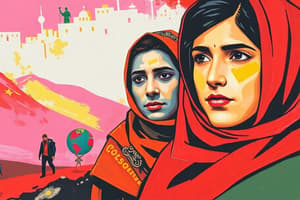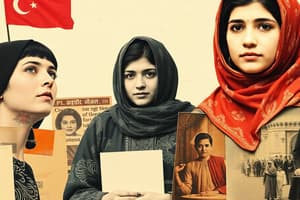Podcast
Questions and Answers
Considering the socio-political context described in the excerpt, what complex interplay of factors most acutely influenced the decision of girls' families to withdraw them from school?
Considering the socio-political context described in the excerpt, what complex interplay of factors most acutely influenced the decision of girls' families to withdraw them from school?
- Widespread fundamentalist religious conversions triggered by Fazlullah's radio broadcasts, resulting in a genuine belief that female education contravenes Islamic principles.
- A confluence of genuine fear for the girls' physical safety, deeply ingrained patriarchal norms dictating female obedience, and a pragmatic assessment of the government's inability to ensure security. (correct)
- A calculated strategy by community leaders to undermine governmental authority and consolidate power by manipulating public sentiment against secular education for women.
- Primarily economic hardships exacerbated by the Taliban's insurgency, leading families to prioritize immediate survival needs over the perceived long-term benefits of education for their daughters.
Malala's internal conflict, balancing defiance with understanding of her culture's norms, reveals a nuanced perspective on agency. Which philosophical concept BEST encapsulates this internal struggle?
Malala's internal conflict, balancing defiance with understanding of her culture's norms, reveals a nuanced perspective on agency. Which philosophical concept BEST encapsulates this internal struggle?
- Existentialist angst, embodying the burden of freedom in the face of an absurd reality.
- Hegelian dialectic, reflecting the synthesis of individual will and societal constraints. (correct)
- Kantian categorical imperative, emphasizing the universality of moral duty despite personal inclinations.
- Utilitarian calculus, weighing the potential benefits of education against the perceived risks to personal safety.
The phrase 'doing fahashi' is translated as ‘being indecent’. Considering the historical usage of such accusations, which post-structuralist perspective offers the most insightful deconstruction of this claim?
The phrase 'doing fahashi' is translated as ‘being indecent’. Considering the historical usage of such accusations, which post-structuralist perspective offers the most insightful deconstruction of this claim?
- Judith Butler's performativity theory, highlighting how gender and sexuality are constructed through repeated performances that normalize certain behaviors while marginalizing others.
- Edward Said's Orientalism, exposing how Western representations of Eastern cultures often construct the ‘Other’ as inherently immoral or uncivilized.
- Michel Foucault's analysis of power/knowledge, illustrating how dominant discourses define and punish deviations from established norms of behavior. (correct)
- Jacques Derrida's deconstruction, revealing the inherent instability and contextual dependence of meaning in linguistic constructs.
Given the closure of schools and the targeting of individuals by the Taliban, what game-theoretic model BEST represents the strategic interactions between the Taliban, the government, and the civilian population?
Given the closure of schools and the targeting of individuals by the Taliban, what game-theoretic model BEST represents the strategic interactions between the Taliban, the government, and the civilian population?
If Malala's father decides to postpone the winter break until January 14, what are the most likely second-order effects to consider when evaluating the efficacy and ethical implications of this decision, assuming a consequentialist ethical framework?
If Malala's father decides to postpone the winter break until January 14, what are the most likely second-order effects to consider when evaluating the efficacy and ethical implications of this decision, assuming a consequentialist ethical framework?
Malala reflects on the limited options available to girls, imagining a life 'indoors, out of sight, with no TV to watch and no books to read'. What is the most critical consideration when evaluating the long-term psychological impact of such imposed social isolation on adolescent girls?
Malala reflects on the limited options available to girls, imagining a life 'indoors, out of sight, with no TV to watch and no books to read'. What is the most critical consideration when evaluating the long-term psychological impact of such imposed social isolation on adolescent girls?
Given the environment described, where the pursuit of education for girls is met with violent opposition, what strategic approach would BEST balance the need for continued learning with the imperative for personal safety, considering both individual and collective well-being?
Given the environment described, where the pursuit of education for girls is met with violent opposition, what strategic approach would BEST balance the need for continued learning with the imperative for personal safety, considering both individual and collective well-being?
Considering the excerpt's description of Fazlullah’s actions and their impact on the community, which framework BEST explains the root causes of radicalization and violent extremism within this context?
Considering the excerpt's description of Fazlullah’s actions and their impact on the community, which framework BEST explains the root causes of radicalization and violent extremism within this context?
What is the MOST salient critique to level against the father's decision to postpone the holiday, considering the risk to the remaining girls as revealed later in the excerpt?
What is the MOST salient critique to level against the father's decision to postpone the holiday, considering the risk to the remaining girls as revealed later in the excerpt?
What inference can be drawn regarding the role and influence of international media, such as the BBC, in shaping the narrative and response to the events unfolding in Swat Valley, based on the mention of Malala's father being contacted by the BBC?
What inference can be drawn regarding the role and influence of international media, such as the BBC, in shaping the narrative and response to the events unfolding in Swat Valley, based on the mention of Malala's father being contacted by the BBC?
Flashcards
Fazlullah
Fazlullah
A Taliban leader known for enforcing strict rules in Swat Valley.
Cultural Restrictions
Cultural Restrictions
Societal norms that dictate behavior, often limiting girls' rights.
Lifeless Dolls
Lifeless Dolls
Malala's metaphor for how the Taliban wanted to control girls' lives.
Depression in Adversity
Depression in Adversity
Signup and view all the flashcards
Education as Hope
Education as Hope
Signup and view all the flashcards
Postponing Holiday
Postponing Holiday
Signup and view all the flashcards
Safety Concerns
Safety Concerns
Signup and view all the flashcards
Radio Station
Radio Station
Signup and view all the flashcards
Vow to Fight
Vow to Fight
Signup and view all the flashcards
Extrajudicial Killings
Extrajudicial Killings
Signup and view all the flashcards
Study Notes
Malala's Diary Entries
- Malala describes the pressure to end school and the Taliban's influence on daily life.
- There was a decrease in the number of girls attending school.
- Parents were concerned for their daughters safety
- The author felt worried about the future
- She reflects on the Taliban's edict for women and the consequences of fighting.
- The girls had to remain in school grounds longer
- The fear of violence and death was ever present.
- There were frequent killings in the area
- People were killed for not adhering to the Taliban's rules (ex: not wearing the prescribed clothing style, for various actions considered immoral)
- The families had to surrender to the Taliban out of concern for safety.
- The author feels immense despair and disappointment and that she cannot help but have a concern for the others and for the country.
School Concerns
- School was due to close January week, but the author's father postponed the holiday.
- They remained in school till January 14
- Their education was important, and they wanted to maximize the remaining time and learn as much as possible.
- Teachers were afraid (so the school was closed)
Personal Reflection
- Reflects on personal hope and how she would approach life in this moment
- Malala’s diary entries reveal the author’s deep personal resolve that drove her dedication to education and fighting for the future of her country's education system, even under difficult circumstances.
Studying That Suits You
Use AI to generate personalized quizzes and flashcards to suit your learning preferences.
Description
Malala's diary entries reflect the increasing pressure to end schooling due to the Taliban's growing influence. The entries highlight the fear and violence prevalent in daily life, the restrictions imposed on women, and the despair felt by the author. The diary also details concerns and postponement of school closures.




